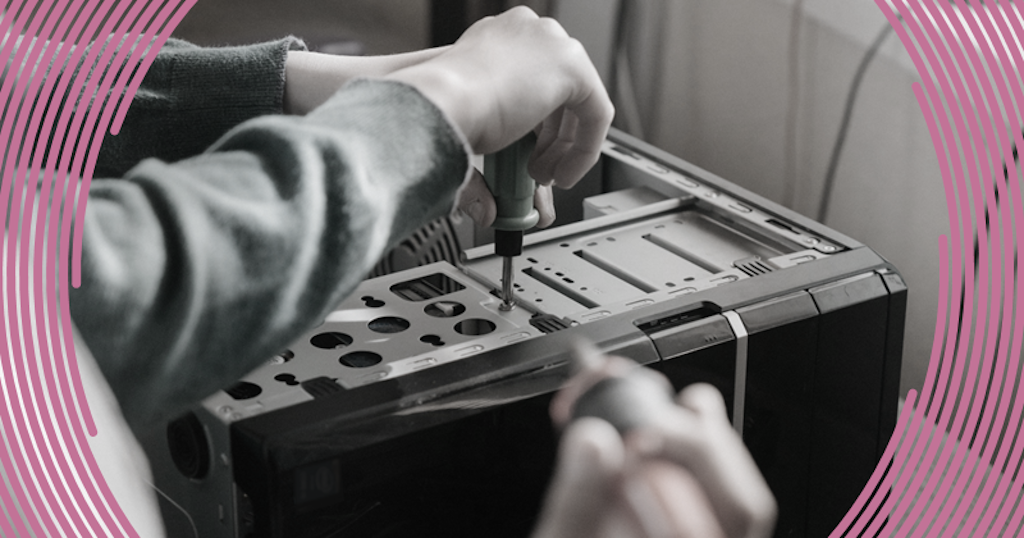The European Union is drafting the legislation for Digital Product Passports to become “the norm for all products regulated under the ESPR (Regulation on Ecodesign for Sustainable Products), enabling products to be tagged, identified and linked to data relevant to their circularity and sustainability.” [1]https://eur-lex.europa.eu/legal-content/EN/TXT/?uri=CELEX%3A52022DC0140&qid=1649112555090
Front-runner companies in several industrial ecosystems have already embraced this transition. In our preceding public meeting on Circularity of Electronics, Usody cofounder David Franquesa and Stephan Fortelny detailed their Digital Product Passports, based on their Software-as-a-Service digital device inventory system that follows devices and parts along their life-cycle:
Usody has been helping repairers and refurbishers since more than five years to create Digital Product Passports for the devices they refurbish and introduce in the second hand market. Usody’s purpose is to increase the durability of devices. The European Commission’s Regulation on Ecodesign for Sustainable Products only reaffirms that our purpose is aligned.
David Franquesa, Cofounder and CEO of Usody
Offering: Get a free Usody account for 3 months* by sending an Email with subject “Free Account – proofing future #circulareconomy” to hello@usody.com*funded through Usody’s EIT Raw Materials Award
Sign up & join our next meetup on 27 July 2022: Explore synergies with Usody cofounder Stephan Fortelny along your interests in Circular Economy Impact Reporting & Digital Product Passports.
Proofing Future thanks all donors and coproducers of recent exchange meetings: Gunther Walden and Joe Marion, and Usody as a long term member of Proofing Future
Usody can support public administrations, brands, compancies, ITADs and refurbishers along their handling of digital devices – purchases, repairs, upgrades, refurbishments, donations, reselling.
Usody is not a market place. We do not sell nor buy digital devices. We just help to trace them in order to provide stakeholders with evicence for a product’s circular economy impact that can be verified.
In our recent interview, Usody CEO David Franquesa details: “A Digital Product Passport stores key data to improve traceability of products and encourages sustainability by standardizing information on a product’s reusability, reparability and upgradability. Changes made to products in the refurbishment process – like technical upgrades – are reflected in our Digital Product Passport as well as product information obtained from the manufacturer’s original product passport.” [2]https://proofingfuture.eu/2022/05/27/circularity-of-electronics/
The European Commission states: “Structuring information on the environmental sustainability of products and transmitting it by means of Digital Product Passports will help businesses along the value chain, from manufacturers, importers and distributors to dealers, repairers, remanufacturers and recyclers, to access information that is valuable in their work to improve environmental performance, prolong product lifetime, boost efficiency and the use of secondary raw materials, thus lowering the need for primary natural resources, saving costs and reducing strategic dependencies. (…) Digital Product Passports can also enable consumers to make more informed choices, improve transparency for public interest organisations and help national authorities in their enforcement and surveillance work.” [3]https://eur-lex.europa.eu/legal-content/EN/TXT/?uri=CELEX%3A52022DC0140&qid=1649112555090
Leandro Navarro, Associate Professor at UPC Universitat Politècnica de Catalunya Barcelona Tech – with a research focus on networking, distributed systems & circular economy – concludes at the end of our recent public meeting exchange on Circularity of Electronics:
- I think, the most important contribution of Usody’s proposal is the fact of collecting traces from devices – its identifiers and parts.
- On the side of the Digital Product Passport you can link this inventory data from Usody to different applications, like the chain of custody – Which devices are yours? Which devices are no longer? Which devices have you purchased, which ones donated, which got properly recycled?
- You can link this inventory data to relevant product information, like plans on “how to repair” or plans on “how to recycle” this device or you can link it to “maintenance instructions”.
- You can also use this inventory data that Usody helps you collecting about devices to compute durability statistics. You can link it with an impact database and be able to deduct environmental impacts.
- If you collect data about a device over its complete life span you can also measure the savings and enablements from further use as well as from final recycling, so you can get a complete life cycle view of the impact of a device.
All of this is based on having reliable inventory data. Imagine this like a web of linked data, where you can link data for different purposes. The Digital Product Passport is one slice of that, providing data about the digital device. You can link this data to the chain of custody. You can translate and multiply that information to get an environmental impact assessment. It all relies on the digital transformation of ownership by using reliable inventory data.
Leandro Navarro, Associate Professor at UPC Universitat Politècnica de Catalunya Barcelona Tech

Offering: Get a free Usody account for 3 months* by sending an Email with subject “Free Account – proofing future #circulareconomy” to hello@usody.com*funded through Usody’s EIT Raw Materials Award
Sign up & join our next meetup on 27 July 2022: Explore synergies with Usody cofounder Stephan Fortelny along your interests in Circular Economy Impact Reporting & Digital Product Passports
Contact Usody cofounder David Franquesa and Stephan Fortelny






